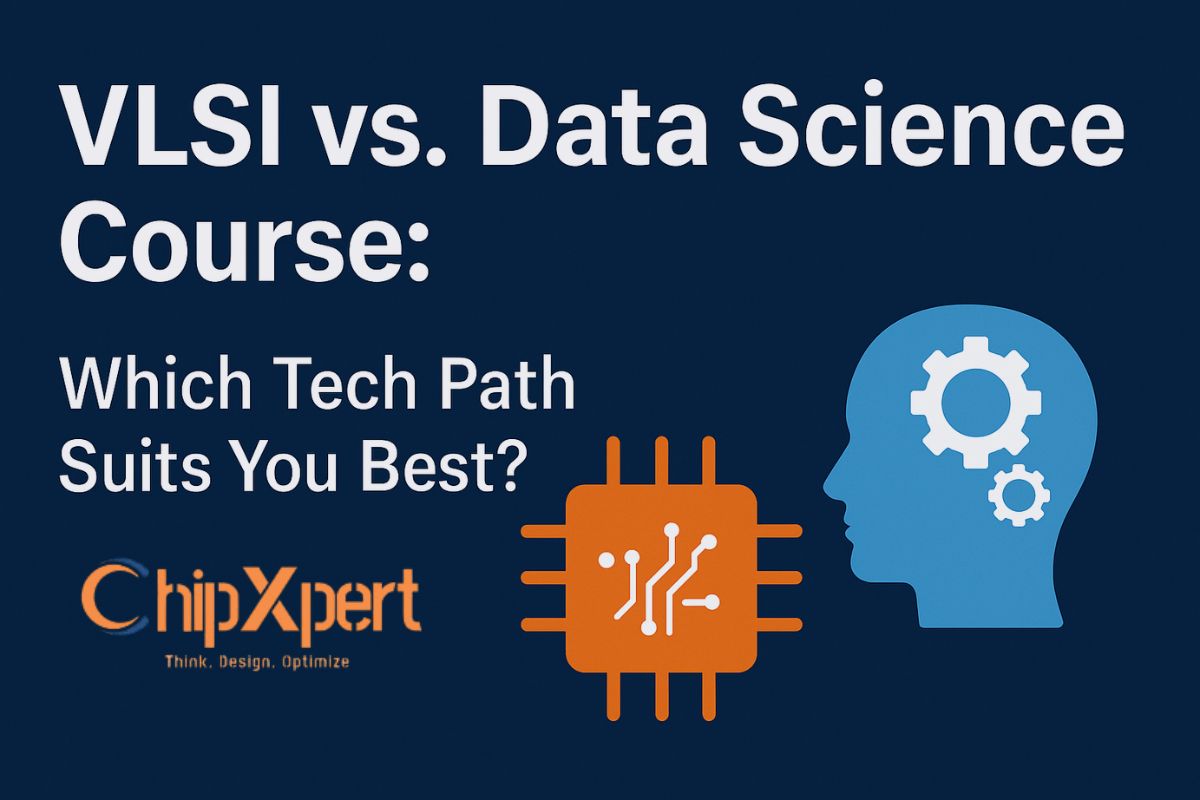VLSI vs. Data Science Course: Which Tech Path Suits You Best?
Your Guide to Choosing Between VLSI and Data Science for a Rewarding Tech Career
Standing at a career crossroads, trying to decide between a VLSI course and a Data Science course? Both fields are exciting, high-demand, and packed with opportunities to work on cutting-edge technology. But they’re built for different passions, skills, and goals. In this friendly guide, we’ll walk you through the key differences between VLSI (Very Large Scale Integration) and Data Science courses, covering what you’ll learn, the jobs you can land, and the growth potential in each. By the end, you’ll have a clear picture of which path aligns with your dreams. Let’s dive in!
What’s a VLSI Course All About?
A VLSI course teaches you how to design and test the microchips that power everything from smartphones to AI systems. It’s a deep dive into the world of hardware, where you’ll work with tools like Verilog, SystemVerilog, and Cadence to create integrated circuits (ICs). If you’re fascinated by the nuts and bolts of electronics, this is your playground.
Who It’s For: B.Tech graduates in Electronics, Electrical, or related fields who love tinkering with circuits and logic design.
What’s a Data Science Course Like?
A Data Science course is all about turning raw data into meaningful insights. You’ll learn to analyze huge datasets, build predictive models, and use tools like Python, R, and machine learning frameworks to solve real-world problems. From improving business strategies to advancing healthcare, Data Science is perfect for those who love numbers and coding.
Who It’s For: Anyone with a knack for analytics and programming, from engineering to math or even non-tech backgrounds.
How Do VLSI and Data Science Courses Compare?
Let’s break down the differences to help you choose the right fit.
1. What You’ll Focus On
- VLSI: You’ll work on hardware, designing and verifying the chips that run devices. Think of it as building the brain of a smartphone or GPU.
- Data Science: This is a software-focused field, where you analyze data to uncover trends, predict outcomes, and drive decisions across industries.
Key Difference: VLSI is about creating the physical tech; Data Science is about unlocking insights from data.
2. Skills You’ll Gain
- VLSI Course:
- Designing digital and analog circuits
- Coding in Verilog or VHDL for chip logic
- Static Timing Analysis (STA) and physical design
- Verification with Universal Verification Methodology (UVM)
- Scripting in TCL or Python for automation
- Using tools like Cadence, Synopsys, or Mentor Graphics
- Data Science Course:
- Programming in Python, R, or SQL
- Building machine learning and deep learning models (TensorFlow, PyTorch)
- Creating data visualizations with Tableau or Power BI
- Mastering statistics and probability
- Working with big data tools like Hadoop or Spark
- Cleaning and preprocessing data
Takeaway: VLSI equips you to build hardware; Data Science prepares you to analyze and interpret data.
3. Course Duration and Cost
- VLSI: Typically runs for 6–8 months, with costs between ₹50,000 and ₹2,00,000. The higher price reflects access to specialized tools and hands-on projects, plus placement support by various leading institutes like ChipXpert VLSI training institute Hyderabad and Bengaluru.
- Data Science: Varies from 3-month bootcamps to 12-month programs, costing ₹30,000 (online courses) to ₹1,50,000 (top institutes). Online platforms like Coursera make it more affordable.
Good to Know: VLSI courses cost more due to niche tools, but they often lead to high-paying jobs quickly.
4. Jobs You Can Land
- VLSI Job Roles:
- RTL Design Engineer
- Verification Engineer
- Physical Design Engineer
- Design for Test (DFT) Engineer
- STA Engineer
- Data Science Job Roles:
- Data Scientist
- Machine Learning Engineer
- Data Analyst
- Business Intelligence Analyst
- AI Research Scientist
Real-World Insight: VLSI jobs are specialized, often in semiconductor companies, while Data Science roles span tech, finance, healthcare, and more.
5. Salary Expectations
- VLSI Salaries (India):
- Entry-Level: ₹5L–₹18L per year (MNCs like Intel or Qualcomm pay on the higher end)
- Mid-Career (3–5 years): ₹15L–₹25L+
- Companies: Intel, Nvidia, Synopsys, Wipro-VLSI, startups like Saankhya Labs
- Data Science Salaries (India):
- Entry-Level: ₹4L–₹12L per year
- Mid-Career (3–5 years): ₹12L–₹20L+
- Companies: Google, Amazon, ZS Associates, fintech startups
Quick Note: VLSI often starts with higher salaries in core companies, but Data Science offers more job openings across industries.
6. Industry Demand and Growth
- VLSI: The semiconductor industry is set to reach $1 trillion globally by 2030, with India’s chip design hubs growing fast. Jobs are concentrated in tech cities like Bangalore and Hyderabad.
- Data Science: With over 1,20,000 open roles in India (2025 estimates), Data Science is in demand across tech, retail, finance, and beyond, offering broader opportunities.
Key Difference: VLSI is niche and high-value; Data Science is versatile and widely applicable.
7. Learning Curve and Background Needed
- VLSI:
- Needs: A strong electronics background (B.Tech in ECE/EEE is ideal).
- Challenge: Steep learning curve due to complex hardware concepts and tools.
- Best For: Those who love circuits, logic, and technical depth.
- Data Science:
- Needs: Basic math, stats, and programming skills (open to all graduates).
- Challenge: Moderate, focusing on coding and analytics.
- Best For: Those who enjoy data, coding, and problem-solving.
Tip: Pick VLSI if hardware excites you; choose Data Science if data and software are your thing.
8. Long-Term Career Outlook
- VLSI: Chip design principles are stable, offering lasting relevance. With experience, you can become a Design Lead, System Architect, or work globally in places like Silicon Valley.
- Data Science: The field evolves quickly, requiring ongoing learning, but its wide applicability ensures job security across industries.
Which Path Is Right for You?
Go for VLSI If:
- You’re passionate about hardware and chip design.
- You have an electronics background and love technical challenges.
- You want a high-paying, niche role with global potential.
- You’re ready for a focused, intensive learning journey.
Go for Data Science If:
- You’re excited about data, coding, and analytics.
- You want to work in diverse industries like tech or finance.
- You prefer a shorter, more flexible learning path.
- You enjoy AI, machine learning, and telling stories with data.
Your Next Step: VLSI or Data Science?
Both VLSI and Data Science open doors to incredible tech careers, but they suit different interests. If you’re thrilled by designing the chips that power the future, VLSI is your path. If you love crunching data and solving problems across industries, Data Science is the way to go. Reflect on your skills and passions, then research institutes with strong placements and hands-on training to kickstart your journey.
Ready to shape the future? Whether it’s building chips or unlocking data insights, your tech adventure starts now!



